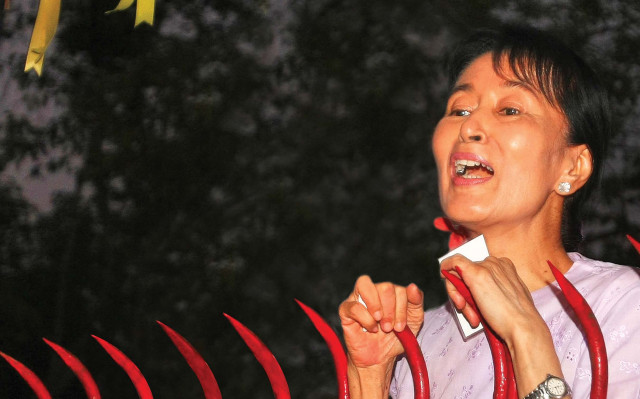Myanmar democracy icon Suu Kyi tastes freedom
Aung San Suu Kyi walked free after seven years as a prisoner in her own home.

Waving and smiling, the Nobel Peace Prize winner appeared outside the crumbling lakeside mansion where she had been locked up by military rulers, to huge cheers and clapping from the waiting crowds.
“We must work together in unison,” she told thousands of waiting people, suggesting she has no intention of giving up her long fight for democracy in what is one of the world’s oldest dictatorships.
“I’m glad that you are welcoming me and supporting me. I want to say that there will be a time to come out. Do not stay quiet when that time comes.”
Many people hugged each other with joy at the sight of the 65-year-old dissident, known in Myanmar simply as “The Lady”.
Wearing a lilac top and purple longyi – Myanmar’s sarong-like traditional dress – she appeared in good health after her latest stretch of detention.
She asked the crowd to come to her party’s headquarters at noon on Sunday to hear her speak after she struggled to make herself heard. “I have many things to say as we haven’t seen each other for a long time,” she said.
World leaders were quick to welcome her release, with US President Barack Obama hailing her as “a hero of mine”.
UN Secretary-General Ban Ki-moon described Suu Kyi as “an inspiration” to the world, but said the junta must free all political prisoners.
Although she has been sidelined and silenced by the regime – occasionally released briefly only to be put back in confinement – for many in the impoverished nation she still embodies hope of a better future.
Despite the risks of opposing the military regime in a country with more than 2,200 political prisoners, many supporters wore T-shirts bearing her image and the words: “We stand with Aung San Suu Kyi.” Undercover police were photographing and filming the crowds.
Myanmar’s most famous dissident has been under house arrest since 2003 – just one of several stretches of detention at the hands of the ruling generals.
Her sentence was extended last year over a bizarre incident in which an American swam uninvited to her lakeside home, sparking international condemnation and keeping her off the scene for the first election in 20 years.
The democracy icon swept her party to victory in elections two decades ago, but it was never allowed to take power.
Her release comes just days after the first vote in the country since 1990, which was boycotted by Suu Kyi’s party and was widely decried in the West as a sham.
Her freedom is a gamble for the generals who have ruled the country since 1962.
When last released in 2002 she drew huge crowds wherever she went – a reminder that years of detention had not dimmed her immense popularity.
Some fear that junta chief Than Shwe will continue to put restrictions on the freedom of his number one enemy.
Suu Kyi’s lawyer Nyan Win has suggested she would refuse to accept any restrictions on activities, as in the past when she tried in vain to leave Yangon in defiance of the regime’s orders.
A government-controlled television station said she was released on account of good conduct during her house arrest.
Her struggle for her country has come at a high personal cost: her husband, British academic Michael Aris, died in 1999, and in the final stages of his battle with cancer the junta refused him a visa to see his wife. She has not seen her two sons for about a decade and has never met her grandchildren.
Suu Kyi’s freedom is seen by observers as an effort by the regime to tame international criticism of Sunday’s election, the first since the 1990 vote.
The NLD’s decision to boycott the election deeply split Myanmar’s opposition and attention is now on whether she can reunite the pro-democracy forces and bring about the change that has eluded Myanmar for so long.
Published in The Express Tribune, November 14th, 2010.



















COMMENTS
Comments are moderated and generally will be posted if they are on-topic and not abusive.
For more information, please see our Comments FAQ